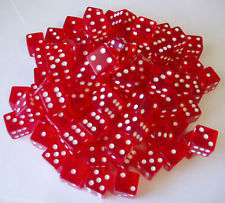100 Days streak problem
 If 100 identical dices are rolled then the_number of different outcomes of the numbers appearing on the dice are?
If 100 identical dices are rolled then the_number of different outcomes of the numbers appearing on the dice are?
The answer is 96560646.
This section requires Javascript.
You are seeing this because something didn't load right. We suggest you, (a) try
refreshing the page, (b) enabling javascript if it is disabled on your browser and,
finally, (c)
loading the
non-javascript version of this page
. We're sorry about the hassle.
1 solution
@Tanishq Varshney Nice problem, and congrats on the streak. :)
Log in to reply
Thank you sir ⌣ ¨
Log in to reply
Congrats! @Tanishq Varshney Keep the streak alive!
Log in to reply
@Nihar Mahajan – Congrats! I once got a 10,100 day streak. Oh, by the way, that's in binary (20). In binary, you'd have a 1,100,100 - a 1.1 million day streak!
Is there a theorem that can be used if the a i aren't distinct? I know that for this problem, if the dice were distinct then the number of ways would be 6 1 0 0 . But if you're trying to find the number of non-distinct ordered pairs ) a 1 , a 2 , a 3 , a 4 ) such that a 1 + a 2 + a 3 + a 4 = 1 0 0 . What would you do then?
Log in to reply
If I understand correctly, I think we would be looking at the partitions of 1 0 0 of size 4 . Looking at a simpler version, say a 1 + a 2 + a 3 + a 4 = 5 where the a i 's are non-negative and non-distinct, we would have solution quadruplets
( 5 , 0 , 0 , 0 ) , ( 4 , 1 , 0 , 0 ) , ( 3 , 2 , 0 , 0 ) , ( 3 , 1 , 1 , 0 ) , ( 2 , 2 , 1 , 0 ) , ( 2 , 1 , 1 , 1 ) .
We could label this as P ( n ; k ) , the number of partitions of n into at most k parts. In this case we have P ( 5 ; 4 ) = 6 . Here is the OEIS listing; there are some formulas but they're pretty scary, and the listing only goes up to 5 5 . However, that's the general idea. :)
Edit: Here is a good paper that I think addresses the matter at hand.
Log in to reply
Ok, wow, I thought there might have been something simple like stars and bars but guess not lol.
That's quite the interesting paper. It was a lot of fun to read through and I learned A LOT. Thanks for showing it to me :)
Log in to reply
@Trevor Arashiro – You're welcome. That is a really good paper; I've bookmarked it for future reference. Partitions show up everywhere, (just like ϕ ); I just learned about Bell numbers last week and have started to realize how significant they are. The more you know ..... :)
Let a k represent the number of dice that show the number k . Then we need to find the number of non-negative integer solutions to the equation
a 1 + a 2 + a 3 + a 4 + a 5 + a 6 = 1 0 0 where 0 ≤ a k ≤ 1 0 0 for integers 1 ≤ k ≤ 6 .
This is a now a stars and bars problem, which according to Theorem two in this link has the solution
( 1 0 0 1 0 0 + 6 − 1 ) = ( 1 0 0 1 0 5 ) = 9 6 5 6 0 6 4 6 .